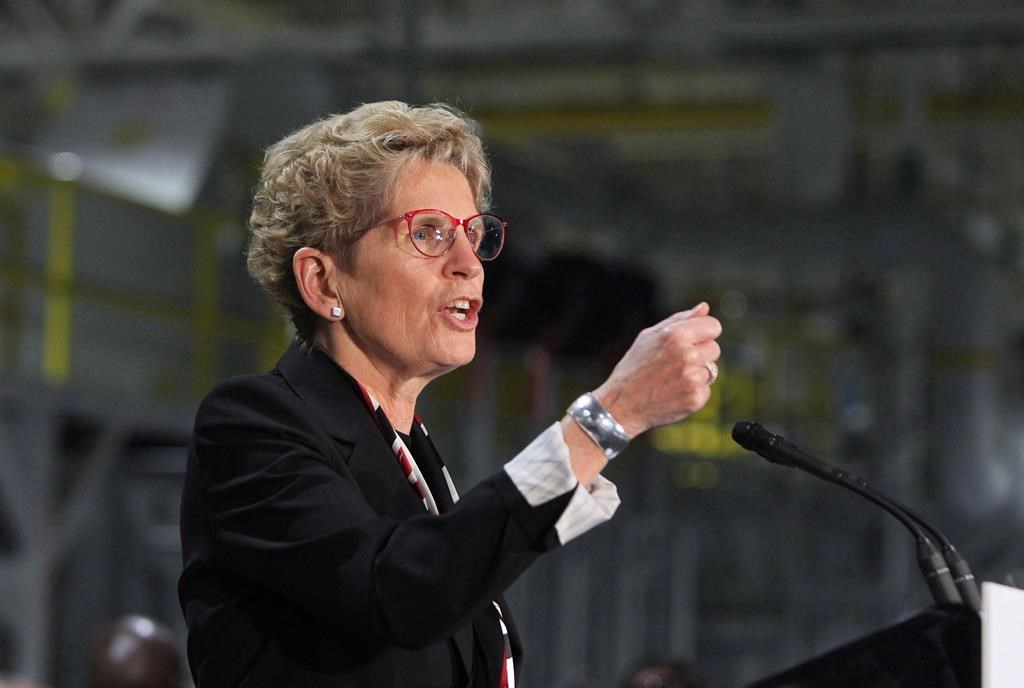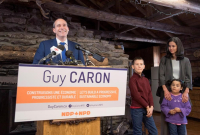Support strong Canadian climate journalism for 2025
Ontario is launching a basic income pilot project this spring, aimed at providing financial stability for low-income residents in a time of precarious work and a changing economy.
Premier Kathleen Wynne announced the details of the province's three-year basic income project during a speech in Hamilton Monday.
"The project will explore the effectiveness of providing a basic income to people who are currently living on low incomes, whether they are working or not," Wynne said. "People participating in our pilot communities will receive a minimum amount of income each year — a basic income, no matter what."
The pilot will launch in the Hamilton area — including in Brantford and Brant County — and the Thunder Bay area late this spring, and in Lindsay this fall, with a minimum payment of nearly $17,000 for an eligible single person.
Ontario is also in the early stages of developing a First Nations basic income pilot project.
Program better than traditional social assistance
Wynne said the level of support isn't extravagant, but will make real difference to a person "striving to reach for a better life."
Technology and automation have changed the nature of work, she said, and some existing jobs have been put at risk.
"What is the best way to help people manage or endure this uncertainty and give them the opportunity to success over the long term? Is it our current system of social assistance? Or is there a better way?" Wynne asked. "For months, we have been doing the background work to explore the idea of a basic income."
Basic income payments are designed to be streamlined compared to traditional social assistance and aim to encourage people to work, without the disincentive of losing social supports.
The province consulted former senator Hugh Segal for advice on building its pilot project.
Segal said the basic income should replace Ontario Works and the Ontario Disability Support Program payments, but be slightly more generous, and it should come with less monitoring and administration than those programs.
In his report, he noted the "Mincome" experiment conducted in Dauphin, Man., and Winnipeg between 1975 and 1978 saw health improvements in the test recipients and the potential for government health savings, with no drop in employment.
Other jurisdictions, including Finland, Kenya and the Netherlands, have launched basic income experiments in recent years.
In Ontario's pilot project, single people will receive up to $16,989 per year and couples will receive up to $24,027 per year. People with disabilities will receive up to an additional $6,000 per year.
Recipients who are employed will keep what they make from their jobs, with their basic income payments decreasing by half their earnings.
For example, a single person earning $10,000 per year from a part-time job would receive $11,989 in basic income ($16,989 less 50 per cent of their earned income), for a total income of $21,989.
Most recipients will be working poor
Participants will continue to receive provincial and federal child benefit payments on top of the basic income.
Ontario Minister of Community and Social Services Minister Helena Jaczek said the majority of the people invited to the pilot project will be "working poor."
"We're not just talking about people on social assistance, not just (Ontario Works and the Ontario Disability Support Program); in fact 70 per cent of the population who are low income are actually those who are in precarious employment, they are working, and they will also be invited," Jaczek said.
The project will also include those who aren't working and those who are homeless.
The government will be looking at several metrics in the test recipients to gauge success, including food security, stress, mental health, health and health-care usage, housing stability, education and employment.
Participants in three regions will be randomly chosen and invited to apply to the pilot project, for which 4,000 people will be selected. It will cost the government $50 million a year.
The Liberal government first announced the pilot project in the 2016 budget.




Comments